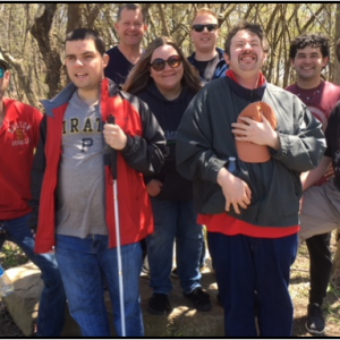The Job Finding service helps find paid work in the community that matches the participant’s skills and interests, while the Job Assessment service reviews the participant’s work history, interests, and skills to determine the best job or training opportunities. The Supported Employment service provides ongoing support for participants with disabilities to function successfully in a work setting without special aid or intervention. All three positions require professional technology skills, good communication, community knowledge and outreach skills, strong organizational skills, and the ability to establish and maintain effective working relationships.
Job Finding
Job Finding service helps waiver participants in finding paid work in the community. Job Finding includes finding a specific job that matches the participant’s skills and interests with an employer’s needs. Successful job finding is a permanent job placement where the participant has worked for at least 30 days. An example of Job Assessment and Job Finding is being tested for different job skills, sharing areas of interest or experience that might be helpful in a job, and applying for a job with an employer who has already been contacted by the job finding provider.
- Professional Technology skills
- Good written and oral communication
- Community knowledge and outreach skill
- Strong organizational skills
- Ability to multi-task and prioritize.
- Ability to establish and Maintain effective working relationships with groups and individuals based on the goals set by each person to live their everyday life.
Job Assessment
Job Assessment service helps waiver participants in finding paid or volunteer work in the community. The service includes reviewing the participant’s work history, interests, and skills to determine what types of jobs and/or training will be best for them. The provider then suggests what kinds of jobs in the community match the participant’s skills, abilities, and interests.
Situational assessments are like a job tryout where the participant performs certain types of job tasks to see if he or she has the ability and/or interest to do that particular type of job.
- Professional Technology skills
- Good written and oral communication
- Community knowledge and outreach skill
- Strong organizational skills
- Ability to multi-task and prioritize.
- Ability to establish and Maintain effective working relationships with groups and individuals based on the goals set by each person to live their everyday life.
Supported Employment
Supported Employment provides ongoing help in keeping a job once the waiver participant has found employment. The Supported Employment service is used to lessen the need for help by supporting the participant in being successful at work without special aid or intervention. The service is provided for participants who, because of their disability, need ongoing support to function in a work setting. Supported Employment is delivered in a community job setting, either volunteer or paid, which includes co-workers who are not disabled.
- Professional Technology skills
- Good written and oral communication
- Community knowledge and outreach skill
- Strong organizational skills
- Ability to multi-task and prioritize.
- Ability to establish and Maintain effective working relationships with groups and individuals based on the goals set by each person to live their everyday life.

